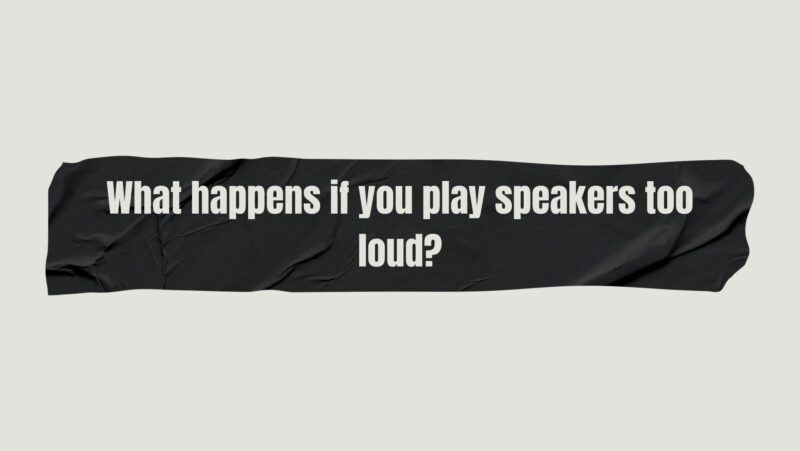The allure of powerful speakers belting out your favorite tunes at ear-piercing volumes is undeniable. Yet, beneath the exhilarating experience lies a potential danger that often goes unnoticed: the adverse effects of playing speakers too loud. From the vibrant festival grounds to the solitude of your living room, understanding what happens when you push speakers to their limits is crucial for preserving both your auditory health and the quality of your audio equipment.
The Mechanics of Sound
Before diving into the consequences, it’s essential to grasp the mechanics of sound and how speakers function. Sound is produced when air molecules vibrate in response to a source, such as a musical instrument or a speaker. Speakers work by converting electrical signals into mechanical vibrations that move air and generate sound waves. The intensity of the vibrations determines the volume of the sound produced. When you increase the volume, the speaker’s diaphragm moves more dramatically, causing greater air displacement and louder sound.
The Threshold of Tolerance
Every speaker has a threshold of tolerance, beyond which it starts to exhibit distressing signs. This threshold is determined by factors like the speaker’s design, materials, and intended usage. When you exceed this limit, the speaker’s components, including the diaphragm, voice coil, and magnets, may experience strains that compromise their performance and longevity.
Consequences of Playing Speakers Too Loud
- Distorted Sound Quality: Pushing speakers to their maximum capacity can lead to distorted sound quality. At high volumes, the diaphragm may move erratically, failing to accurately reproduce the original audio signal. This distortion results in muffled or altered sound, robbing you of the immersive experience intended by the audio creators.
- Permanent Damage to Speakers: The physical components of a speaker are susceptible to damage when operated at extreme volumes. The voice coil, a crucial part of the speaker’s mechanism, can overheat and deform under prolonged high-power conditions. This damage is often irreversible and can lead to a noticeable decrease in audio quality even at moderate volumes.
- Reduced Lifespan: Just as a car’s engine wears out faster when consistently driven at high speeds, speakers pushed to their limits experience a shortened lifespan. Continuous operation at high volumes generates more heat and stress, causing components to degrade over time. This reduces the overall longevity of the speaker and necessitates more frequent replacements.
- Listening Fatigue: Prolonged exposure to excessively loud sound can lead to listening fatigue, which is characterized by feelings of discomfort, irritation, and even pain in the ears. This fatigue can diminish the enjoyment of music and affect your overall auditory experience.
- Hearing Damage: Perhaps the most alarming consequence of playing speakers too loud is the potential for permanent hearing damage. Human ears are sensitive to sound levels above 85 decibels (dB) for extended periods. Playing music at volumes exceeding this threshold increases the risk of noise-induced hearing loss (NIHL), which is irreversible and can lead to partial or complete deafness over time.
Preventive Measures
- Know Your Equipment: Understanding the specifications and limitations of your speakers is paramount. Consult the manufacturer’s guidelines for recommended volume levels and usage patterns.
- Use Acoustic Treatments: Proper room acoustics can significantly improve the audio experience at lower volumes. Strategic placement of acoustic panels, diffusers, and bass traps can help create a balanced sound environment.
- Volume Limits: Implement self-imposed volume limits, especially when using headphones or earbuds. Many modern devices offer volume-limiting features that can help prevent accidental exposure to dangerous sound levels.
- Take Breaks: If you’re in an environment with elevated noise levels, make a conscious effort to take breaks. Allowing your ears to rest between sessions can reduce the risk of listening fatigue and long-term hearing damage.
Conclusion
While the allure of blasting your speakers at maximum volume is undeniable, the consequences of such actions are not to be taken lightly. The distortion of sound quality, potential permanent damage to speakers, reduced lifespan, listening fatigue, and the risk of hearing damage all underscore the importance of responsible audio consumption. By understanding the mechanics of sound, respecting your speakers’ limitations, and implementing preventive measures, you can continue to enjoy your favorite music without compromising your auditory health or the longevity of your beloved audio equipment.


